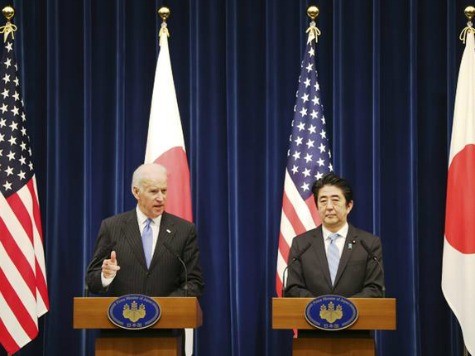In direct response to China’s surprise declaration of an Air Defense Identification Zone over islands belonging to Japan, the latter country announced it will increase military spending by 2.6% in the next five years–a plan calling for more drones, submarines, and work with U.S. contractors.
According to Reuters, the humble-sounding 2.6% increase will amount to around $232.4 billion when all is said and done and will overhaul much of Japan’s military technology. This is the first boost in military spending in a decade under Prime Minister Shinzo Abe, who promised both a remedy for the Japanese economy and a stronger military presence in a region where disputes over sovereignty abound.
Accusing China of “attempting to change the status quo by force” in the East China Sea, Japan’s announcement declared China’s behavior a “concern” that the country and international community needed to address. China declared an Air Defense Identification Zone (ADIZ) over what Japan calls the Senkaku Islands, and sent fighter planes over the area almost immediately after its declaration to identify and follow U.S. and Japanese vessels.
Boosting their military arsenal is the first step, they assured, toward addressing the China situation. The AFP released an infographic mapping the specifics in Japan’s new program involving much more amphibious weaponry and a reduction in tanks, as well as fighter jets and drones–in other words, weaponry for fighting over islands, not on land. Japan also has island disputes with South Korea, though at a much less heated level than those with China, and addressed in their new military program the perennial looming threat of North Korea’s volatility.
The Abe administration appears not to want to stop at merely amassing more weaponry, instead also looking to involve U.S. contractors in their national defense, as well as reviewing some World War II established law on Japan’s defense. Abe hopes to lift Japan’s ban on weapons exports, which would allow Japanese companies to become international defense contractors.
Abe has also broached the topic of amending Japan’s Constitution, an archaic World War II instrument designed by the United States, which prevents Japan from maintaining armed forces beyond self-defense. More than half of Japanese citizens polled this year approve of amending the Constitution to strengthen Japan’s military. Despite this, the Japanese government has assured the international community that it has “no intention of becoming a military power.”
China has reacted warily to the news of Japan’s push to militarize. The nation’s state newspaper, Xinhua, blasted Prime Minister Abe for his “right-leaning politics and surging nationalism” and called the move “irresponsible.” Quoted in the same, a spokeswoman for the Chinese foreign ministry urged Japan to “face and sincerely review its history” and look toward peace, a reference to Japan’s violence against mainland China during World War II.
As for the United States, it has stood alongside Japan in this dispute since it arose. Vice President Joe Biden visited both nations, and the U.S. military sent planes to fly over the area in solidarity and sent a submarine hunter for protection to Japan last week. Despite the military disagreements of the last century, public opinion polls routinely demonstrate a shared affection and trust between Japan and the United States, only increasing as both countries perceive China as a looming threat. A 2011 poll reported that among the Japanese, the United States enjoyed a record high 82% approval rating as a global player, and the feeling is mutual; a Gallup poll found Americans hold record high positive views of Japan this decade.
A more robust Japanese military would potentially minimize the official role of the American military in the area, which has been stationed on the southern Japanese island of Okinawa since World War II. It would also boost business for military contractors, especially if the Japanese do not amend their Constitution to allow a standing army. Such inability to defend themselves at any given time makes the country dependent on foreigners, mostly the United States, in their defense against China.
Amending the Japanese Constitution is a tall order, however–one that must take a backseat to their current military needs addressed through immediate spending.

COMMENTS
Please let us know if you're having issues with commenting.